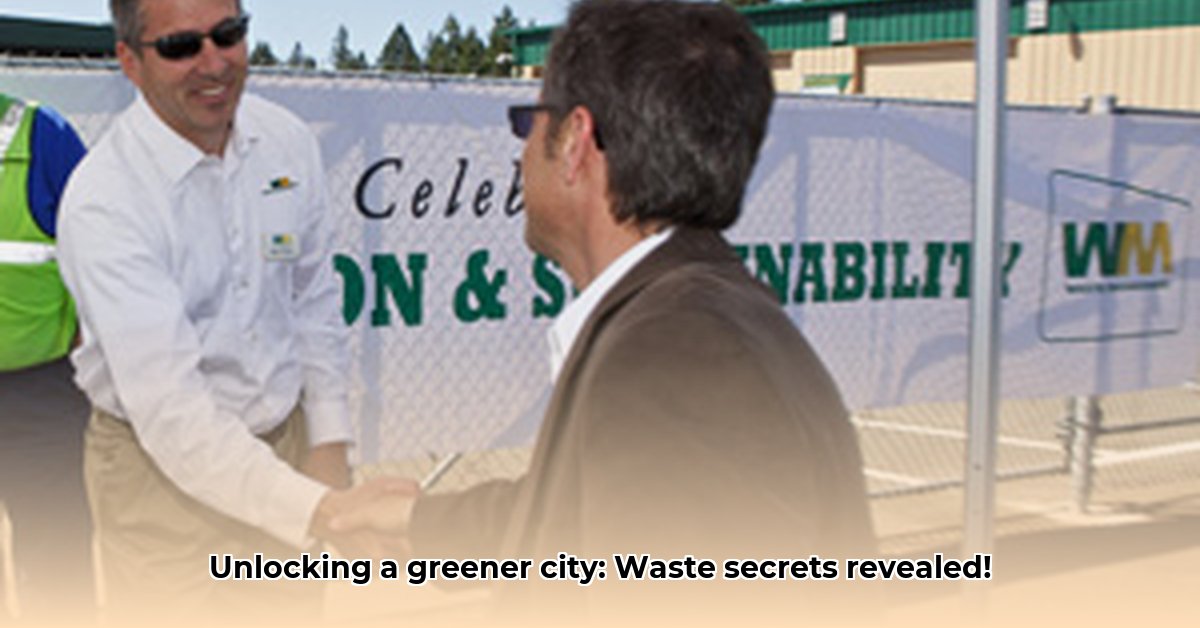
This comprehensive guide helps Newberg residents navigate the city's waste management system, fostering a cleaner, greener community. We'll explore curbside collection, the Newberg Transfer Station, e-waste and asbestos disposal, and community initiatives, empowering you to make a real difference. For examples of other city recycling programs, check out this helpful resource.
Understanding Newberg's Waste Management System
Newberg's waste management system relies on a combination of curbside collection and the Newberg Transfer Station to process a wide variety of materials. Effective waste management is crucial for environmental protection and community health. How well do you understand the nuances of Newberg's system?
Curbside Collection: Your First Line of Defense
Newberg provides convenient curbside collection for household garbage, bi-weekly recycling (including glass!), and yard waste. This simple system forms the foundation of the city's waste management strategy. Are you maximizing your use of curbside services? Proper sorting is key to ensuring efficient recycling.
The Newberg Transfer Station: Beyond Curbside Convenience
The Newberg Transfer Station handles materials exceeding the capacity of curbside pickup. It's a crucial component of the city's infrastructure, processing a broader range of materials, but with specific rules and fees. Before your visit, check the city website ([1]: https://www.wmnorthwest.com/transferstation/newberg.htm) or call for details on accepted materials and associated costs. What is the key to a smooth Transfer Station visit? Preparation!
Your Step-by-Step Guide to the Newberg Transfer Station
Mastering the Newberg Transfer Station process is straightforward. Following these steps will guarantee a smooth and efficient experience:
Pre-Trip Organization: Sort materials at home to save time and avoid confusion at the station. Securely pack or tie down items to prevent spills and maintain a clean environment. This preemptive step significantly improves your site visit.
Check-In and Fees: Follow directional signage upon arrival and be prepared to pay any applicable fees. This process is typically quick and easy.
Proper Disposal: Adhere strictly to on-site instructions. Items often need sorting into designated areas, so keeping a keen eye on signage is essential. Mistakes here may lead to delays and additional fees.
Clean Up: After unloading, ensure your area is clean and tidy. Maintaining a clean environment benefits everyone. Your cooperation helps keep the Transfer Station efficient and pleasant for all users.
Tackling Specialized Waste: E-waste and Asbestos
While the Transfer Station handles many materials, some require specialized attention. How does Newberg address the challenges of e-waste and asbestos disposal?
E-waste Disposal: A Growing Concern
E-waste (old computers, televisions, etc.) cannot be discarded in regular trash. Newberg is actively working to improve information accessibility regarding proper e-waste disposal. Current options are limited, highlighting the need for improved infrastructure and public awareness. Did you know that improper disposal of e-waste can significantly harm the environment?
Asbestos Disposal: Safety First
Disposing of asbestos requires strict adherence to regulations to ensure community safety. The city's ongoing efforts to improve communication and regulation enforcement will drastically reduce risks. What are the consequences of improper asbestos disposal? Serious health risks to the community.
Community Partnerships: Collective Action for a Greener Newberg
Newberg's commitment to environmental sustainability extends beyond basic waste collection. Community initiatives like the "Library of Things" foster reuse, reducing reliance on new purchases. These crucial partnerships play a significant role in the city's sustainability efforts. What is the long term goal for Newberg’s waste management programs? A more sustainable future for the whole community.
Making a Difference: Your Role in a Sustainable Newberg
The following table illustrates short-term and long-term goals for key stakeholders in Newberg's waste management efforts:
| Stakeholder | Short-Term Goals | Long-Term Vision |
|---|---|---|
| City of Newberg | Improve signage, e-waste recycling information. | Advanced e-waste recycling infrastructure; city-wide awareness campaign. |
| Waste Management | Conduct community surveys; understand resident needs. | User-friendly online resource; efficient issue reporting system. |
| Newberg Residents | Proper use of curbside and Transfer Station services. | Active participation in reuse programs; proactive waste reduction. |
| Oregon DEQ | Provide easily accessible asbestos handling resources. | Enhanced enforcement of responsible material disposal regulations. |
Potential Challenges and Solutions: A Proactive Approach
Addressing potential challenges proactively ensures the ongoing success of Newberg's waste management strategy:
| Risk Factor | Likelihood of Occurrence | Potential Impact | Proposed Mitigation Strategies |
|---|---|---|---|
| Inadequate e-waste handling | High | Significant environmental harm | Expand drop-off points; launch targeted educational campaigns. |
| Non-compliance with asbestos rules | Medium | Serious health risks | Improve communication; strengthen enforcement of regulations. |
| Transfer Station capacity issues | Low | Minor disruption | Ongoing capacity monitoring; long-term infrastructure planning as needed. |
By actively participating in Newberg's waste management system, residents become integral to creating a healthier and more sustainable community. Let's work together to keep Newberg beautiful!